Top CRM Software for Managing Customer Relationships in 2025
Explore the top CRM software of 2025 that enhances customer relationships, boosts conversions, and supports business growth.

92% of businesses now rely on CRM software to boost revenue, with companies reporting a 300% increase in conversions after adoption. Whether you're a small business or an enterprise, the right CRM can streamline operations, improve customer retention by 47%, and scale with your growth.
Here’s a quick look at the top CRM platforms in 2025:
- Salesforce: Best for enterprises with advanced AI, analytics, and integrations. Plans start at $25/user/month.
- HubSpot CRM: Free core platform, ideal for growing businesses with sales, marketing, and support tools.
- Microsoft Dynamics 365: Enterprise-level CRM with AI, modular design, and seamless Microsoft integrations.
- Zoho CRM: Affordable and flexible, starting at $14/user/month, great for SMBs.
- Pipedrive: Simple pipeline management for sales teams, starting at $14.90/user/month.
- Insightly: Combines CRM with project management, perfect for mid-sized businesses.
- SuperOffice: Modular CRM with AI tools, tailored for European SMBs.
- Sage CRM: Integrated workflows with deployment flexibility for various industries.
- Monday CRM: Visual boards and AI-driven automation for sales teams, starting at $12/user/month.
- Odoo CRM: An open-source CRM solution offering full customization, integration with ERP modules, and affordability for growing businesses.
- Keap: Focuses on automating sales and marketing for SMBs, saving time and increasing revenue.
Best CRM Software 2025? (Top 6 CRMs Tested & Compared)
Quick Comparison
| CRM Platform | Starting Price (per user/month) | Best For | Key Features |
|---|---|---|---|
| Salesforce | $25 | Enterprises | AI, analytics, integrations, scalability |
| HubSpot CRM | Free (core) | Growing businesses | Sales, marketing, and support tools |
| Microsoft Dynamics 365 | Modular pricing | Enterprises | AI, modular design, Microsoft ecosystem |
| Zoho CRM | $14 | SMBs | Affordable, customizable, AI assistant |
| Pipedrive | $14.90 | Sales teams | Visual pipelines, automation, integrations |
| Insightly | $29 | Mid-sized businesses | CRM + project management |
| SuperOffice | $60 (Service) | European SMBs | Modular design, AI tools, ERP integrations |
| Sage CRM | Varies by deployment | Industry-specific workflows | Integrated workflows, flexible deployment |
| Monday CRM | $12 | Sales teams | Visual boards, AI automation, customizable dashboards |
| Keap | Varies by features | SMBs | Sales and marketing automation, time-saving workflows |
Select a CRM based on your business size, goals, and required features. The right choice will enhance efficiency, improve customer relationships, and support your growth.
1. Salesforce
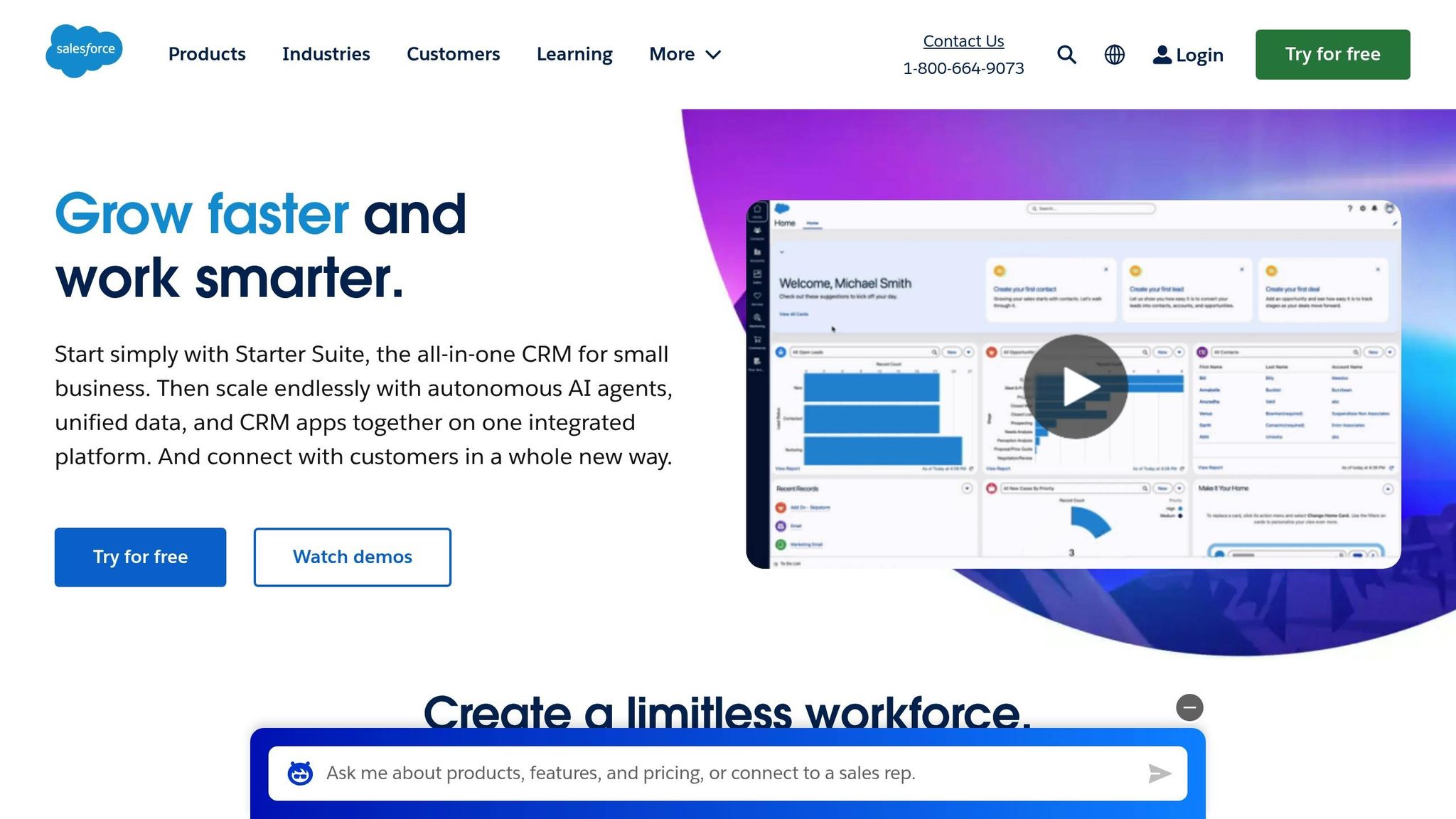
Salesforce stands out with its advanced tools, ease of use, and ability to grow with your business.
The Salesforce Customer 360 platform supports over 150,000 companies worldwide. It offers a variety of modules, including Sales Cloud (pipeline management), Service Cloud (customer support), Marketing Cloud (marketing automation), Commerce Cloud (e-commerce), Experience Cloud (portals), and Einstein AI (predictive analytics). By 2025, it will also feature Slack integration for real-time collaboration and MuleSoft Anypoint for seamless data connectivity.
| Plan | Monthly Price per User |
|---|---|
| Essentials | $25 |
| Professional | $75 |
| Enterprise | $150 |
| Unlimited | $330 |
Many enterprises choose Salesforce for its strong security, ability to scale, and AI-powered customization options.
Next, we’ll look at HubSpot CRM and how it simplifies automation for growing teams.
2. HubSpot CRM
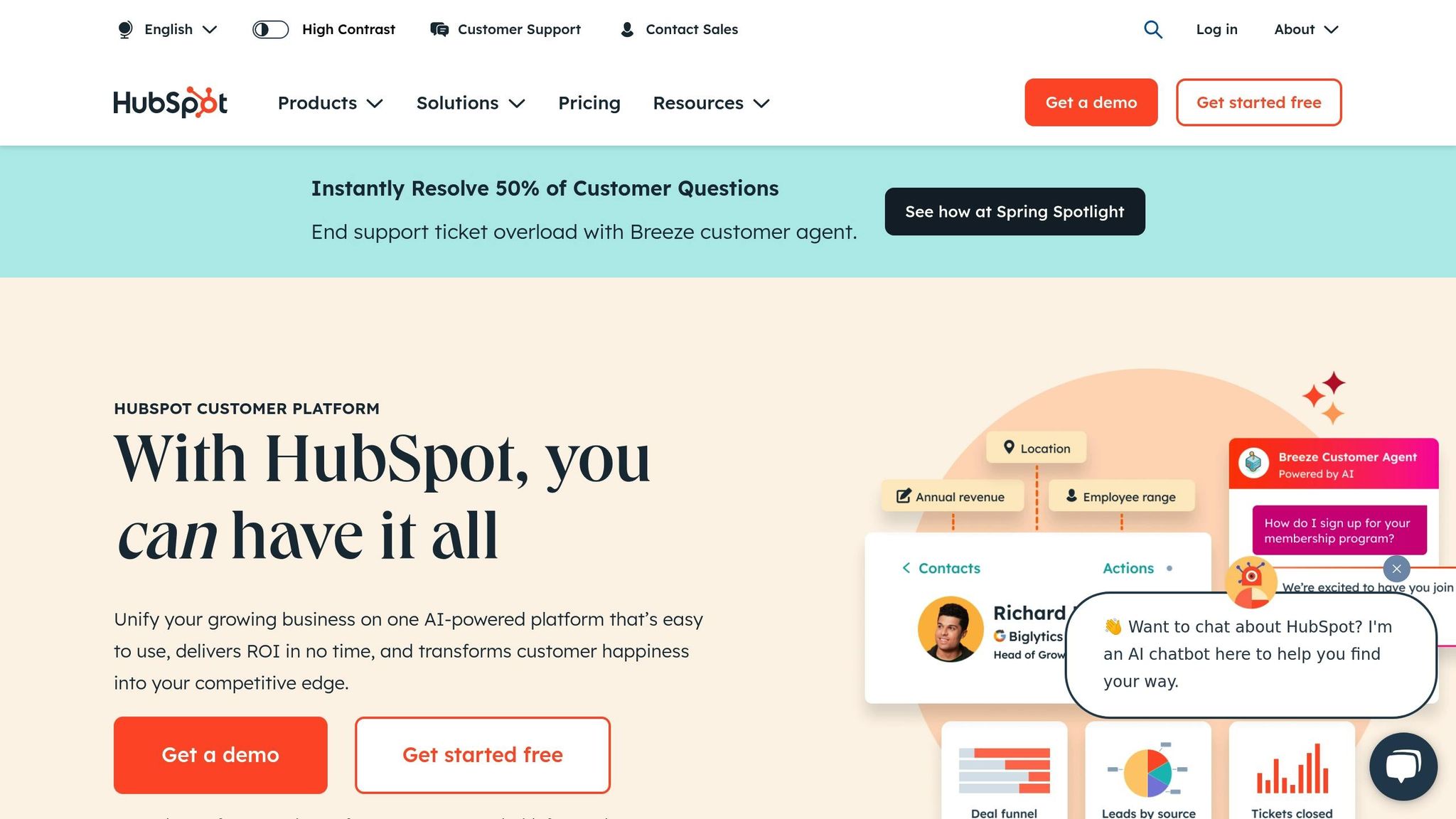
HubSpot CRM stands out by combining user-friendly tools with a free core platform designed for sales, marketing, and support teams. It works seamlessly with apps like Gmail and Slack, automatically updates records, tracks interactions, and offers 24/7 support along with free training through HubSpot Academy.
HubSpot organizes its features into three main hubs:
| Hub | Core Features | Best For |
|---|---|---|
| Sales Hub | Contact and pipeline management | Sales Teams |
| Marketing Hub | Email marketing, tracking, and social media management | Marketing Teams |
| Service Hub | Customer support | Support Teams |
Unlike Salesforce, which targets enterprise users, HubSpot offers a scalable solution. Teams can start with the free version and expand to advanced hubs as their needs grow.
Next, we'll dive into Microsoft Dynamics 365's enterprise-level CRM.
3. Microsoft Dynamics 365
Microsoft Dynamics 365 is a collection of business applications designed to improve efficiency and customer experiences using AI and advanced analytics. For example, Dynamics 365 Business Central has been shown to deliver a 162% ROI over three years, while Dynamics 365 Sales can increase seller productivity by 15%. The platform's modular design allows businesses to choose specific tools - like sales, marketing, customer service, field service, or finance - based on their needs.
Here are some real-world examples of how companies have used Dynamics 365 effectively:
- Enterprise Integration: Campari unified its global data systems.
- Manufacturing Improvements: Toyota implemented mixed reality to enhance production processes.
- Customer Service: HP sped up issue resolution using Dynamics 365 Customer Service.
Dynamics 365 also includes features like IoT integration, mixed reality capabilities, and advanced analytics. It works seamlessly with Microsoft 365, Azure, and the Power Platform, making it easy for organizations to start with a single app and expand to a fully integrated system if needed.
Up next, Zoho CRM brings AI-driven automation and customizable modules to simplify workflows.
4. Zoho CRM
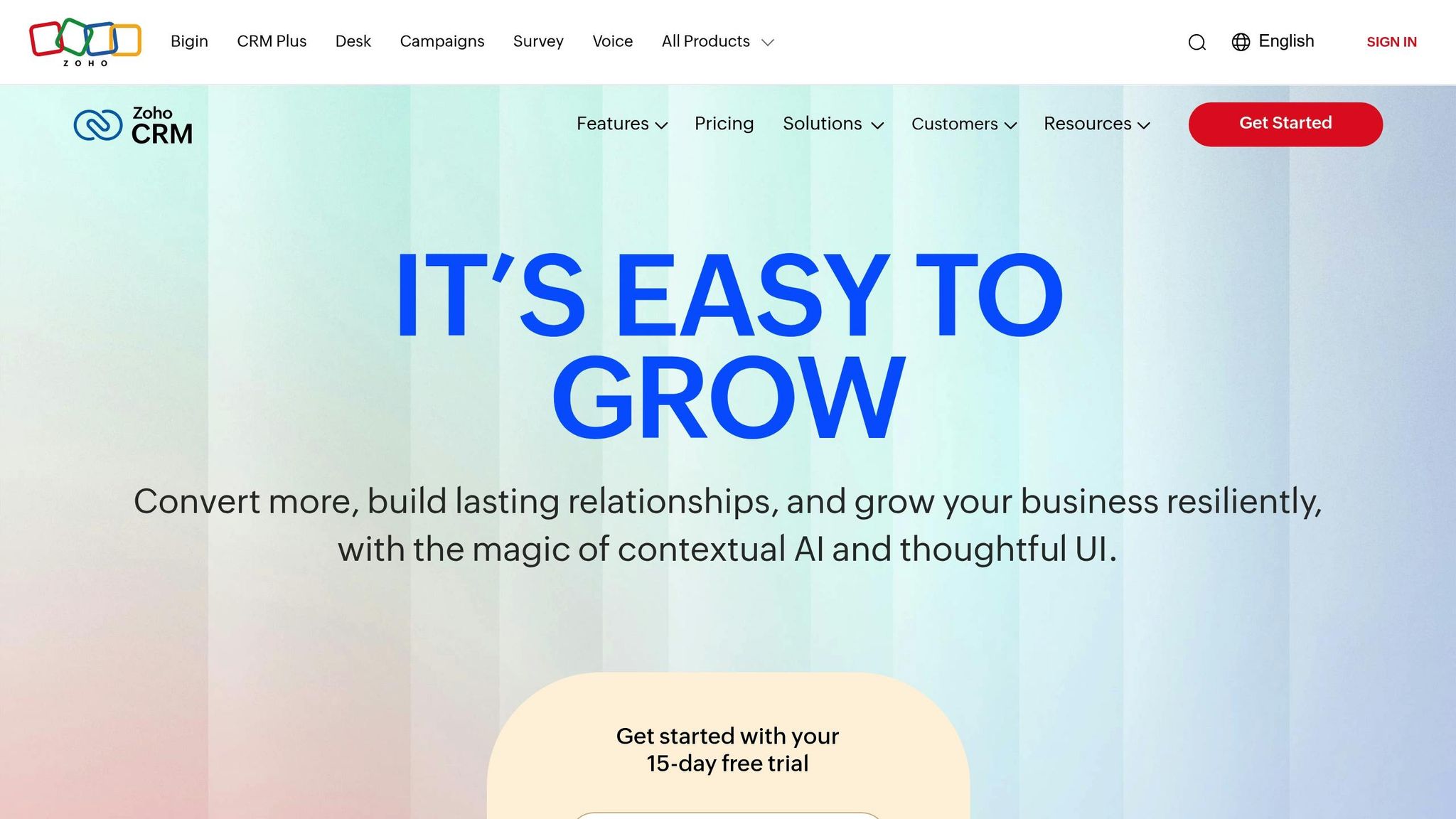
Zoho CRM stands out as a budget-friendly, flexible option for small and midsize businesses (SMBs), especially when compared to enterprise-level tools like Dynamics 365. It offers a range of features, including its AI assistant, Zia, which helps predict leads, spot anomalies, and even provides voice assistance for smoother operations.
Communication Channels and Features
Zoho CRM brings together multiple communication tools in one place:
| Communication Channel | Features |
|---|---|
| Works seamlessly with popular email clients | |
| Social Media | Tools for monitoring and engaging with audiences |
| Live Chat | Real-time customer support |
| SMS | Built-in messaging capabilities |
| Self-service Portals | Allows customers to access support and resources |
Customization and Integrations
Zoho CRM is highly adaptable, allowing businesses to modify page layouts, fields, and modules to fit their needs. Plus, it integrates smoothly with platforms like Outlook, Google Workspace, and Office 365.
Pricing Plans
Zoho CRM offers plans to fit various budgets:
| Plan | Price/User/Month (Annual Billing) |
|---|---|
| Free Edition | $0 (up to 3 users) |
| Standard | $14 |
| Professional | $23 |
| Enterprise | $40 |
| Ultimate | $52 |
This makes Zoho CRM a great choice for SMBs looking for a CRM that’s both scalable and easy to customize.
Up next, let’s look at Pipedrive, which focuses on intuitive sales pipeline management.
5. Pipedrive
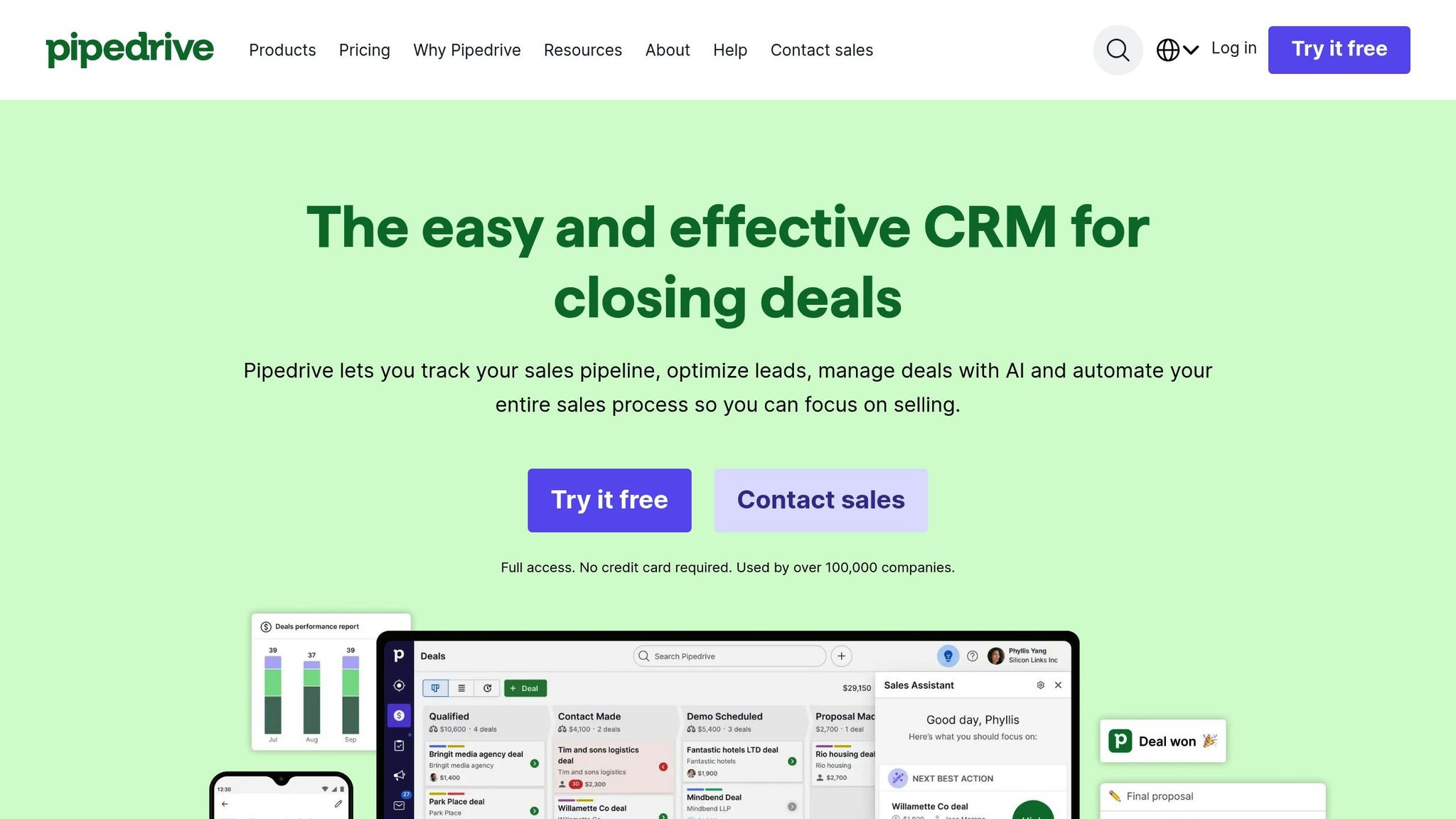
Pipedrive stands out for its easy-to-use visual pipeline management, making it a go-to tool for small and medium-sized sales teams. Its interface is simple to navigate, yet packed with features that help streamline sales processes.
- Pipeline management: Customizable pipelines and visual deal tracking
- Lead management: Features include lead generation, scoring, and automated assignment
- Communication: Built-in email integration
- Automation: AI-driven insights and workflow automation
- Analytics: Real-time reporting tools
- Integrations: Works with Slack, Trello, Zapier, and offers an open API for custom workflows
Pricing (billed annually, per user/month):
- Essential: $14.90
- Advanced: $34.90
- Professional: $49.90
- Power: $64.90
- Enterprise: $99.90
"Pipedrive is a strong choice for growing sales teams with straightforward sales processes. It's intuitive, easy for sales reps to get started with, and supported by excellent customer service." – Paddy Stobbs, Stackfix Co-Founder & CEO
With a Stackfix rating of 7.3/10 and over 96,500 LinkedIn followers, Pipedrive caters to teams of 5-50 users who prioritize simplicity and scalability. Its adaptable pipelines and AI-powered insights make it an excellent choice for teams looking to grow without overcomplicating their workflows.
Up next, see how Insightly’s automation and integrations improve midmarket workflows.
6. Insightly
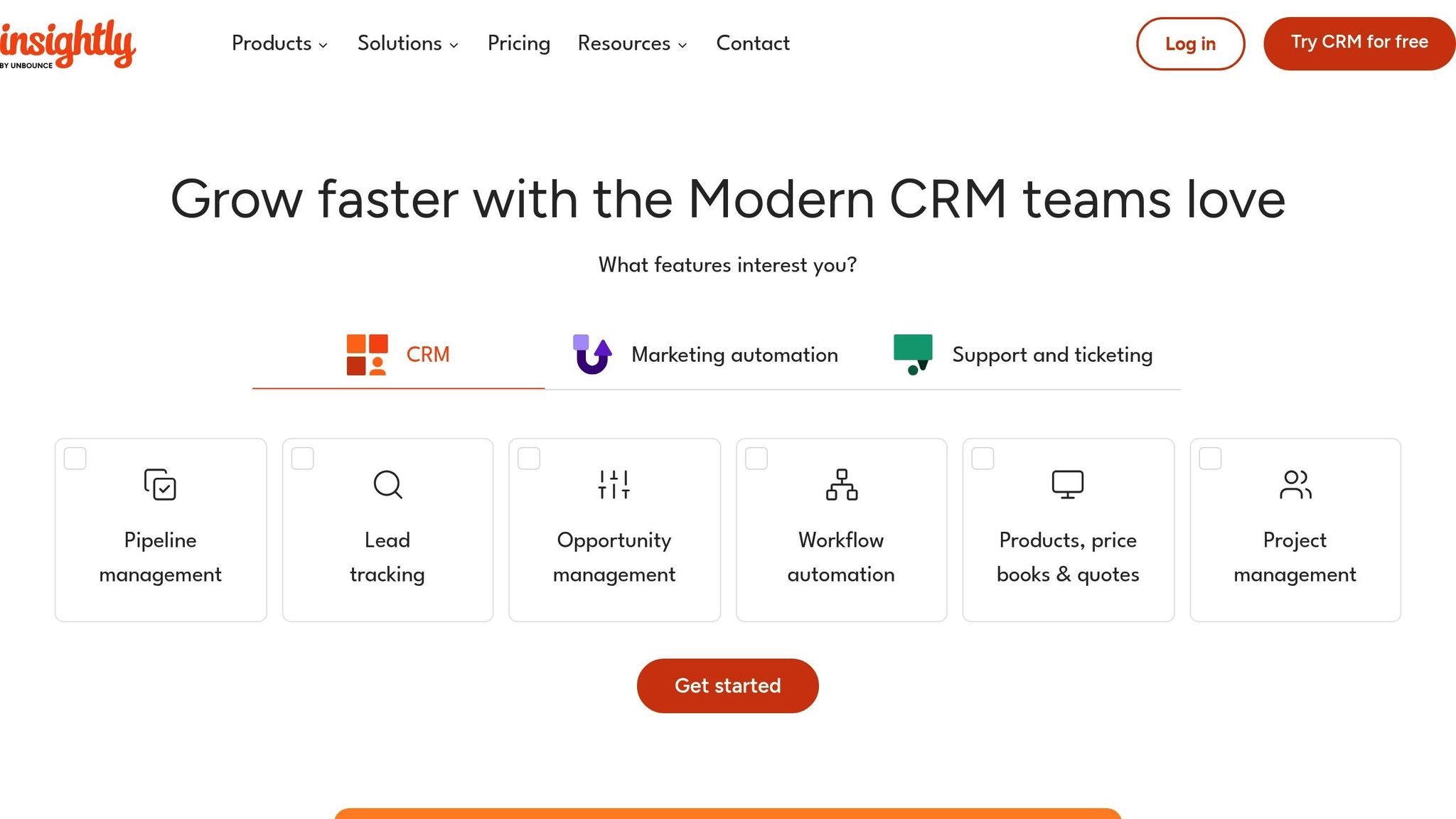
Insightly combines contact management with project tracking, making it a solid choice for small to midsize professional services, manufacturing, and technology firms with teams of 10–50 users. Beyond CRM, Insightly brings project workflows into the mix, similar to Pipedrive’s sales pipelines.
Key Features
| Feature Category | Capabilities |
|---|---|
| Core Functions | Contact management, lead tracking, email marketing |
| Project Tools | Timeline tracking, task assignments, document storage |
| Automation | Trigger-based workflows, email templates, mass emailing |
| Integration | Gmail, Office 365, MailChimp, Dropbox |
| Customization | Over 50 custom fields (Plus plan), custom apps (Enterprise plan) |
Pricing (Annual billing, per user/month) [12]
- Plus: $29
- Professional: $49
- Enterprise: $99
Additional highlights include project Kanban views, business card scanning, and segmented communication tools. Insightly also offers detailed reporting and access to a marketplace with sector-specific add-ons, making it a practical choice for businesses looking to streamline operations and scale effectively.
7. SuperOffice
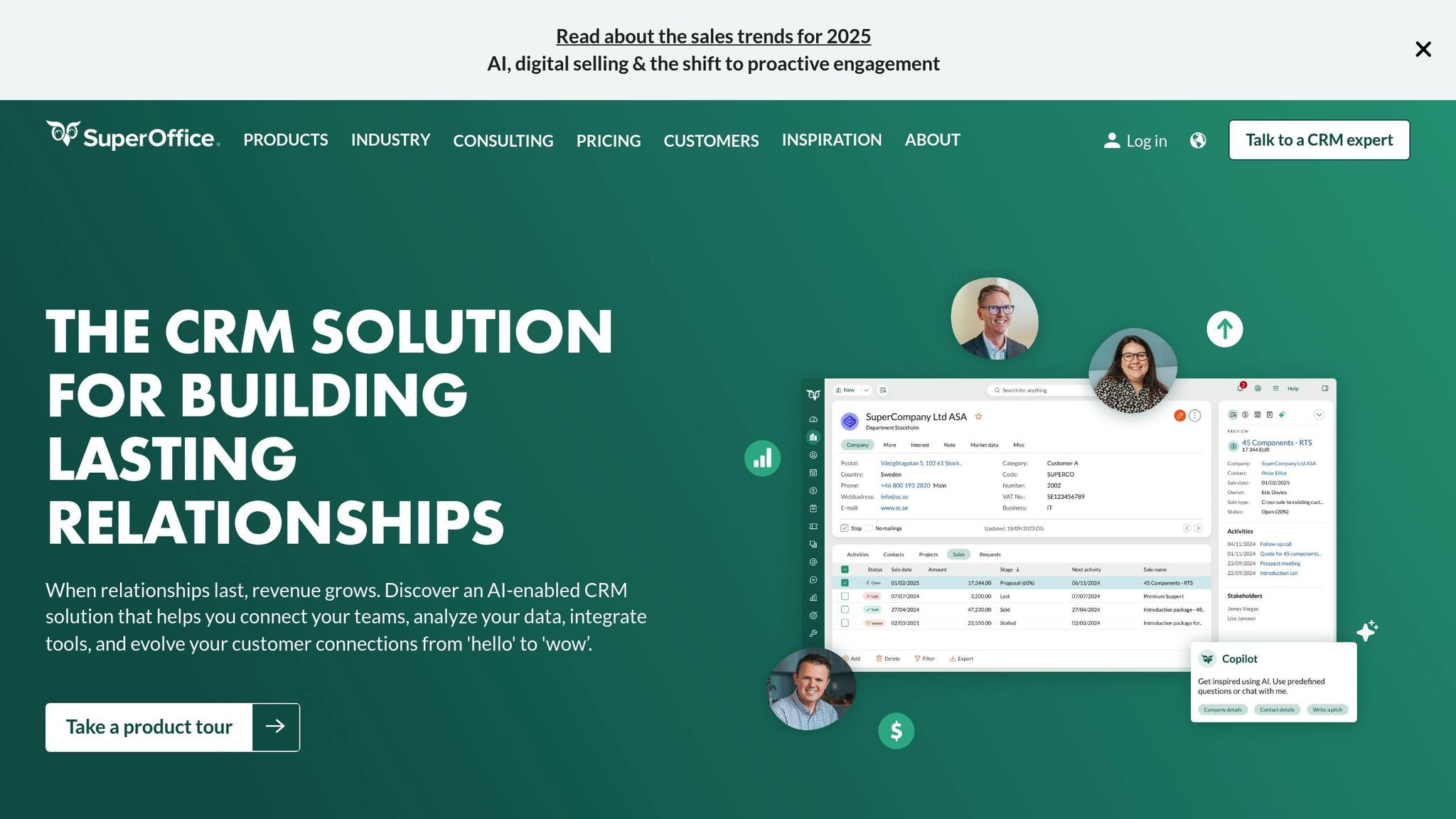
SuperOffice, a CRM provider based in Europe, caters to small and medium-sized businesses. In January 2025, it rolled out a revamped user interface along with new AI tools. Its modular structure makes it a flexible option for SMBs.
Key Features
| Feature Category | Capabilities |
|---|---|
| Core Functions | Manage contacts, track sales, automate marketing |
| AI Assistant | SuperOffice Copilot for automating tasks and offering predictive insights |
| Integration | Connects with ERP systems, Slack, Trello, Visma Business, and Microsoft Dynamics NAV |
| Customization | Access hundreds of apps via the App Store and use APIs for tailored solutions |
Pricing (Annual Billing)
- Sales: $74 per user/month
- Service: $60 per user/month
- Marketing: $371 per site/month
These prices apply when billed annually.
SuperOffice has proven effective for various businesses. For instance, Vitec reduced response times by 75%, while Sharp achieved better collaboration and cost savings using the platform.
"With this updated experience, we are delivering what our customers have asked for - a modern, intuitive interface coupled with AI tools that truly make a difference in their daily work. AI features such as SuperOffice Copilot are designed to increase productivity, automate routine tasks and save time. This usability lets teams focus on building customer relationships." - Thomas Rødseth, Chief Product & Technology Officer
Next, we’ll take a look at Sage CRM and its tailored workflows for specific industries.
8. Sage CRM
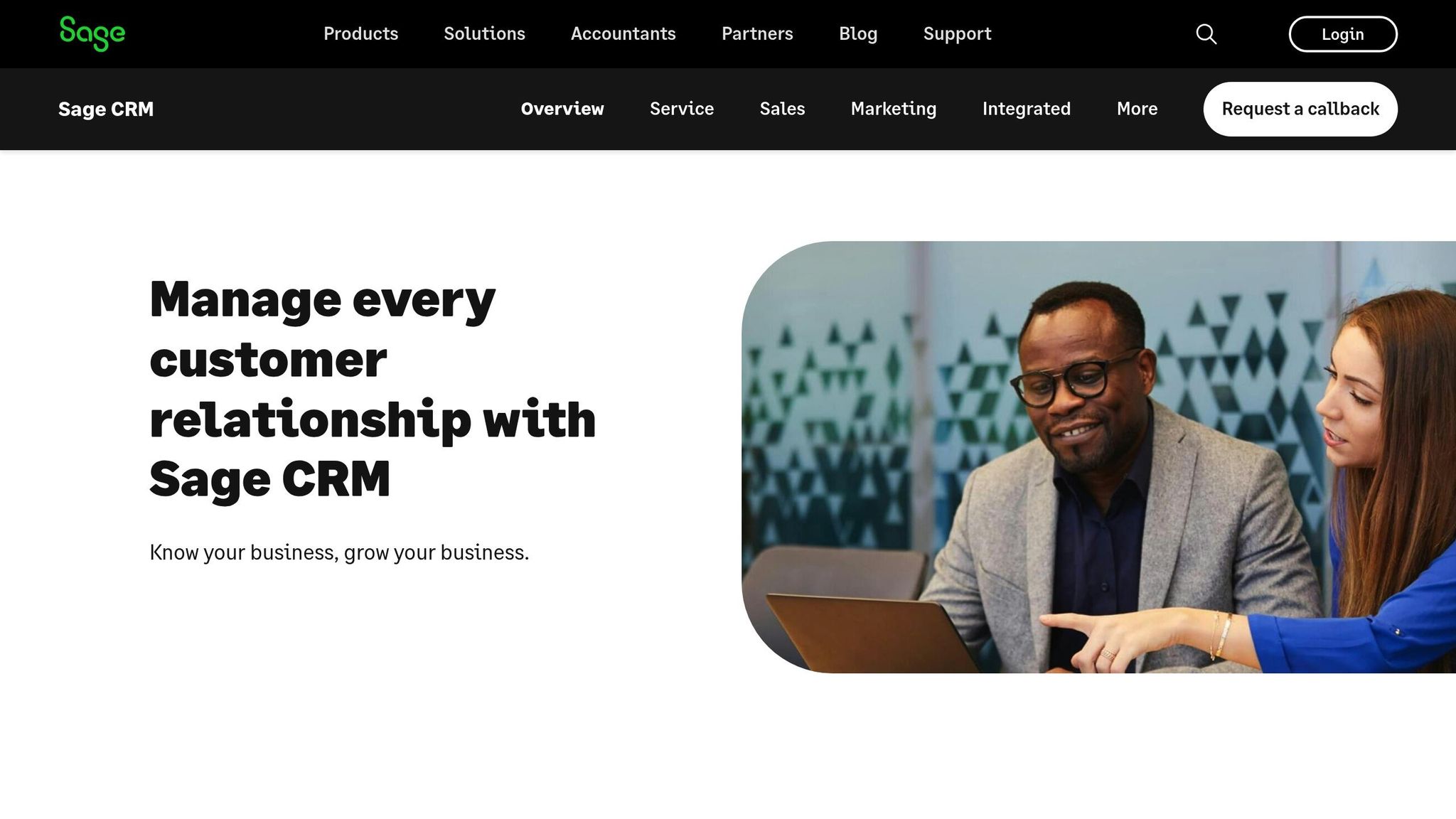
Sage CRM combines CRM tools with business automation to streamline sales, marketing, and operational processes. Unlike SuperOffice's modular setup, it provides a more integrated approach.
Key Features
| Feature Category | Capabilities |
|---|---|
| Core Functions | Contact and account management, quote and order management, pipeline tracking |
| Sales Automation | Automated quotes, sales forecasting, lead conversion workflows |
| Marketing Tools | Email templates, campaign wizard, social media integration |
| Mobile Access | Real-time customer data, activity scheduling |
| Integration | ERP systems, email platforms, social media channels |
These tools are designed to handle the demands of evolving workflows, AI-driven insights, and scalable systems.
Business Intelligence Tools
Customizable dashboards provide a unified view of customer data, including social media monitoring and enriched records.
Deployment Options
Sage CRM offers flexibility with three deployment choices:
- Cloud-based: Includes automatic updates and patches for hassle-free maintenance.
- On‑premises: Offers full control over data and infrastructure for businesses with specific needs.
- Hybrid: Combines the accessibility of cloud solutions with the security of on-premises systems.
Seamless Integrations
Sage CRM integrates effortlessly with other Sage tools like Sage X3, Sage 100c, and Sage 300c. This enables automated workflows across departments, from sales to HR and marketing. Features like a three-step email wizard and Mailchimp integration simplify targeted campaigns, offering detailed analytics on open and click rates.
With its automation capabilities and flexible deployment, Sage CRM is a solid choice for teams that rely on data to drive decisions. Next, we'll explore how Monday CRM reinvents pipeline management with its visual boards.
9. Monday CRM
Monday CRM combines the user-friendly design of monday.com with the robust features of a CRM, making it a standout choice in 2025. Its flexible interface and AI-powered automations make managing sales processes easier than ever.
Core Features
| Feature Category | Details |
|---|---|
| Customization | No-code setup, custom rules and permissions, personalized dashboards |
| Sales Tools | Pipeline templates, timeline views, workload management tools |
| AI Integration | Lead tracking, automatic contact updates, sentiment analysis, text summarization |
| Analytics | Custom charts, detailed reports, and performance tracking |
Pricing Options
| Plan | Monthly Cost per User (billed annually) | Ideal For |
|---|---|---|
| Basic | $12 | Small teams needing essential CRM features |
| Standard | $17 | Growing businesses looking for automation tools |
| Pro | $28 | Larger teams requiring advanced functionality |
All plans require annual billing and a minimum of three users.
Why It Matters for Businesses
A significant 26.2% of sales leaders report their teams spend over half their time struggling with technology instead of selling. Monday CRM addresses this issue with its easy-to-use interface and time-saving automations.
Integration Capabilities
Monday CRM integrates seamlessly with tools like Slack, Gmail, Mailchimp, and HubSpot. Storage options range from 5 GB to 1,000 GB, and activity histories span from one week to five years, depending on the plan.
"The solution shouldn't be 'we just bought a CRM, so now we have to completely restructure how we do business to fit the software.' Instead, the CRM should adapt to how the company actually operates."
– Kerri Linsenbigler, The CRO Club
Monday CRM has been recognized as one of the top simple CRM systems and earned a perfect pricing score.
Next, learn how Keap blends CRM with marketing automation.
10. Keap
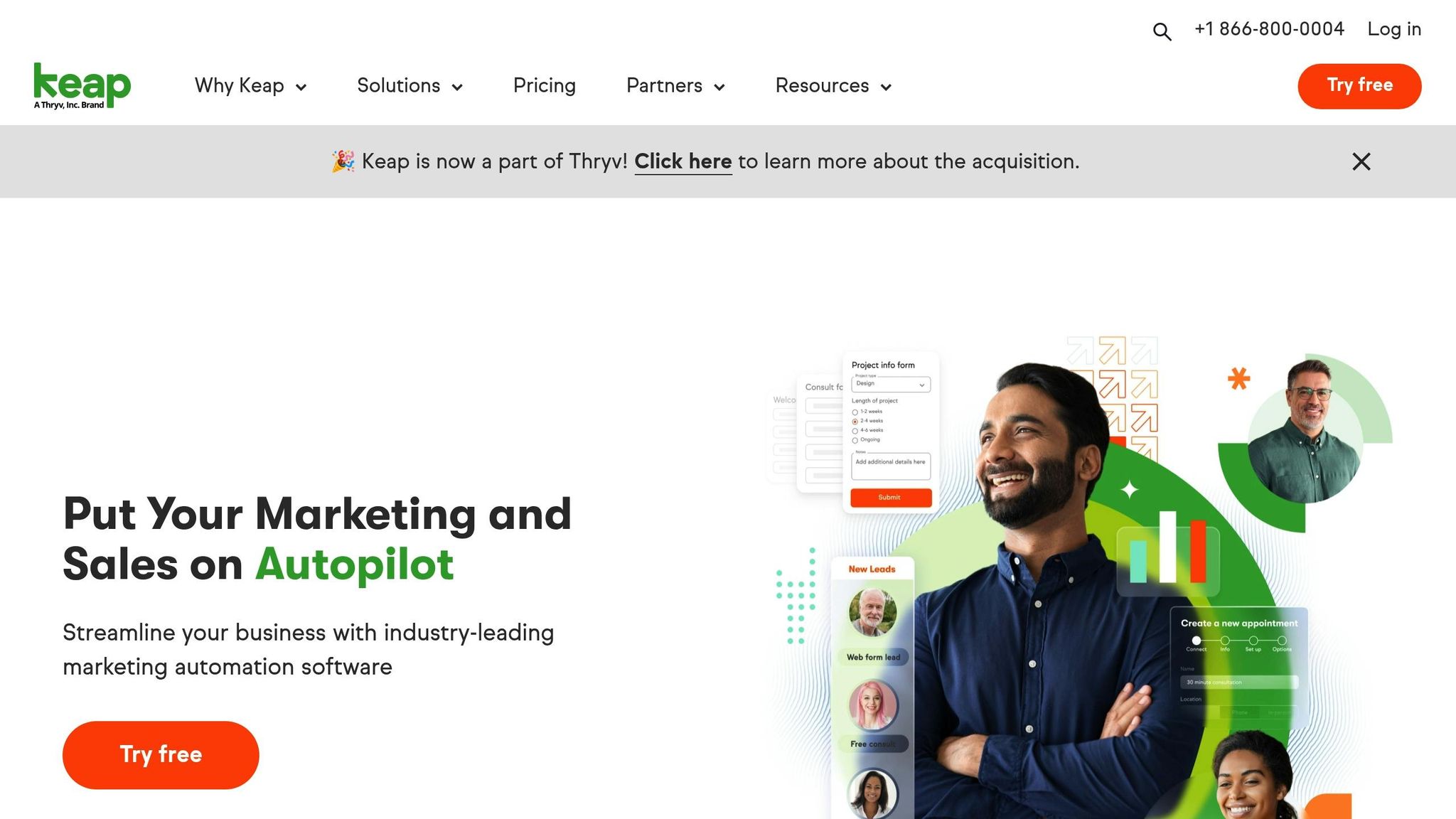
Keap, previously known as Infusionsoft, focuses on automating repetitive sales tasks for small and medium-sized businesses (SMBs). Unlike Monday CRM's visual boards, Keap prioritizes streamlining customer relationship processes to save time and boost efficiency.
Key Automation Features
| Feature Category | Capabilities |
|---|---|
| Contact Management | Custom profiles, notes, and audience segmentation |
| Lead Generation | Web forms, landing pages, and social media integrations |
| Marketing Automation | Email campaigns, lead scoring, and automated follow-up reminders |
| Sales Pipeline | Drag-and-drop visual sales funnel builder |
| Integrations | Compatible with Shopify, Zapier, and Google Workspace |
Time and Revenue Benefits
Keap users report saving an average of 10 hours per week and seeing a 38% increase in revenue. This allows businesses to shift their focus to building stronger customer relationships instead of handling repetitive tasks.
Simplified Workflow Management
Keap’s visual workflow builder makes it easy to create and manage complex sales processes. By dragging and dropping elements, users can design customer journeys with ease. Typical components include:
- Lead Capture Forms: Customizable forms that automatically add leads to contact records.
- Email Sequences: Automated responses triggered by customer actions.
- Follow-Up Tasks: Scheduled reminders and task assignments to keep the sales process moving.
Best Practices for Data Management
| Practice | How to Implement |
|---|---|
| Contact Review | Regularly audit and update contact information to maintain accuracy. |
| Segmentation | Refresh tags and audience segments to ensure precise targeting. |
| Team Training | Offer onboarding sessions and ongoing training to keep the team up to date. |
Data based on user-reported averages for weekly time savings and revenue growth.
Features and Pricing Overview
Here's a quick breakdown of starting prices and key features for three popular CRM platforms, designed to help you align your budget with your business needs.
| CRM Platform | Starting Price | Key Features | Best For | User Rating |
|---|---|---|---|---|
| Salesforce | $25/user | Flexible customization and scalability | Enterprise teams | 8/10 |
| HubSpot CRM | Free core; paid hubs start at $50/user | Includes marketing automation tools | Mid-sized businesses | 8/10 |
| Zoho CRM | $12/user | Wide range of features and integrations | Small businesses seeking adaptability | 8.5/10 |
For pricing and features of other platforms like Pipedrive, Insightly, SuperOffice, Sage CRM, Monday CRM, and Keap, refer to earlier sections.
This overview offers a starting point for comparing CRMs. Use it to narrow down options and identify platforms that align with your budget and goals before diving into detailed evaluations.
Final Thoughts
When choosing a CRM platform, keep these four essentials in mind: security and compliance features, integration options, mobile usability, and AI-driven tools.
As you assess different CRM options, pay attention to:
- Scalability: Opt for a subscription plan that supports your business's growth without running into tech limitations.
- Industry fit: Prioritize platforms designed specifically for your sector instead of one-size-fits-all solutions.
- User experience: The platform should be easy to use while still offering advanced functionality.
Whether you're drawn to Salesforce's robust enterprise tools, HubSpot's no-cost core platform, or Zoho's cost-effective solutions, compare each against these key factors. The right CRM will align with your goals, team needs, and future plans.

